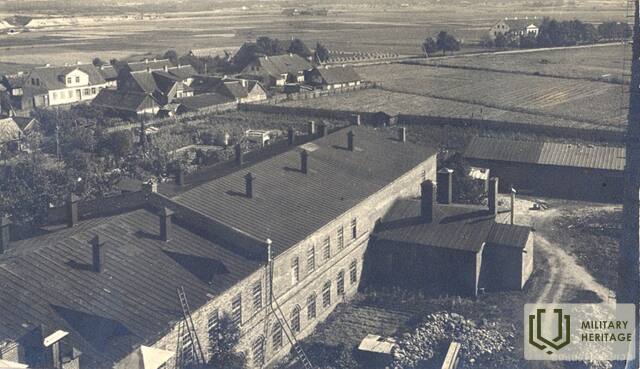Buvusi medžio apdirbimo įmonė „Vulkāns“
Galinga gamykla, turinti turtingą istoriją, siekiančią 1878 m.
Šiandien einant šiuo taku sunku įsivaizduoti, kad jo pakraštyje stovėjo galinga, turtingą istoriją turinti gamykla. XIX amžiaus viduryje Švedijai pavyko pagaminti gana saugius degtukus, kurie neužsiliepsnojo nuo menkiausios trinties. 1878 m. Kuldygoje gyvenantis žydų verslininkas Louis A. Hirschman įkūrė Kuldygos degtukų fabriką, kuris išgarsėjo dėl savo saugios degtukų uždegimo masės recepto, o įvairių spalvų – raudonos ir geltonos. Iki 1930 m. ant degtukų dėžučių etikečių buvo spausdinamas elnias, nes savininko pavardė „Hirsch“ vokiškai reiškia elnias. Fabrikas išsiplėtė, buvo modernizuotas nauja įranga, atidarytas filialas Salduse. Jau 1890 m. degtukai buvo eksportuojami į JAV, Iraną, Afganistaną, Kiniją ir Japoniją. Iki 1901 m. įmonės produkcija buvo laimėjusi 11 aukso ir 5 sidabro apdovanojimus. Pirmojo pasaulinio karo metu įmonės veikla sustojo, tačiau darbastaliai buvo evakuoti į Rusiją. Tarpukariu gamykla buvo pertvarkyta į faneros gamyklą, o XX a. 4-ajame dešimtmetyje ji tapo viena moderniausių faneros gamyklų Europoje. Produkcija buvo eksportuojama į Vakarų Europos šalis. 1940 m. įmonė buvo nacionalizuota. Dėl Antrojo pasaulinio karo sukeltos krizės gamybos apimtys sumažėjo. Antrojo pasaulinio karo metu gamyklos patalpos buvo naudojamos kariniams tikslams, tačiau po karo gamykla iki 1949 m. buvo vokiečių karo belaisvių stovykla. Karo belaisviai buvo įdarbinti ruošiant rąstus miške, gamybos procese ir kituose darbuose. 1944 m. pabaigoje, Vokietijos armijai atsitraukiant, naujausios gamyklos mašinos buvo išmontuotos eksportui į Vokietiją, išimtos elektros varikliai, pavarų dėžės ir kitos vertingos dalys. Tačiau darbininkai sumaniai sudėjo bevertesnes dalis į išvežimui skirtas dėžes. Dėl šios priežasties gamykloje netrukus buvo galima atnaujinti gamybą po Vokietijos kapituliacijos. Sovietinės okupacijos metais „Vulkāns“ gamino įvairius gaminius – fanerą, radijo imtuvų išorinius korpusus, „Estonia“ pianinų dėklus, virtuvės įrangą, mokyklinius baldus ir daug daugiau. Devintajame ir dešimtajame dešimtmečiuose įmonės veiklą stabdė eksploatacinių medžiagų tiekimo vėlavimai ir atsisakymas bendradarbiauti, todėl įmonė merdėjo. 2000 m. „Vulkāns“ kilo gaisras, o po dvejų metų UAB „Vulkāns“ buvo paskelbta nemokia. 2010 m. UAB „Vulkāns“ buvo likviduota. Dėl ilgalaikės jos veiklos Ventos pakrantėse susikaupė didžiuliai atliekų ir pjuvenų laukai. Šiandien jos pašalintos, o upės pakrantė sutvarkyta.
Medienos apdirbimo gamykla „Vulkāns“ [internete]. [Žiūrėta 2024-05-24]. Prieinama: https://industria.lndb.lv/companies/22/history









